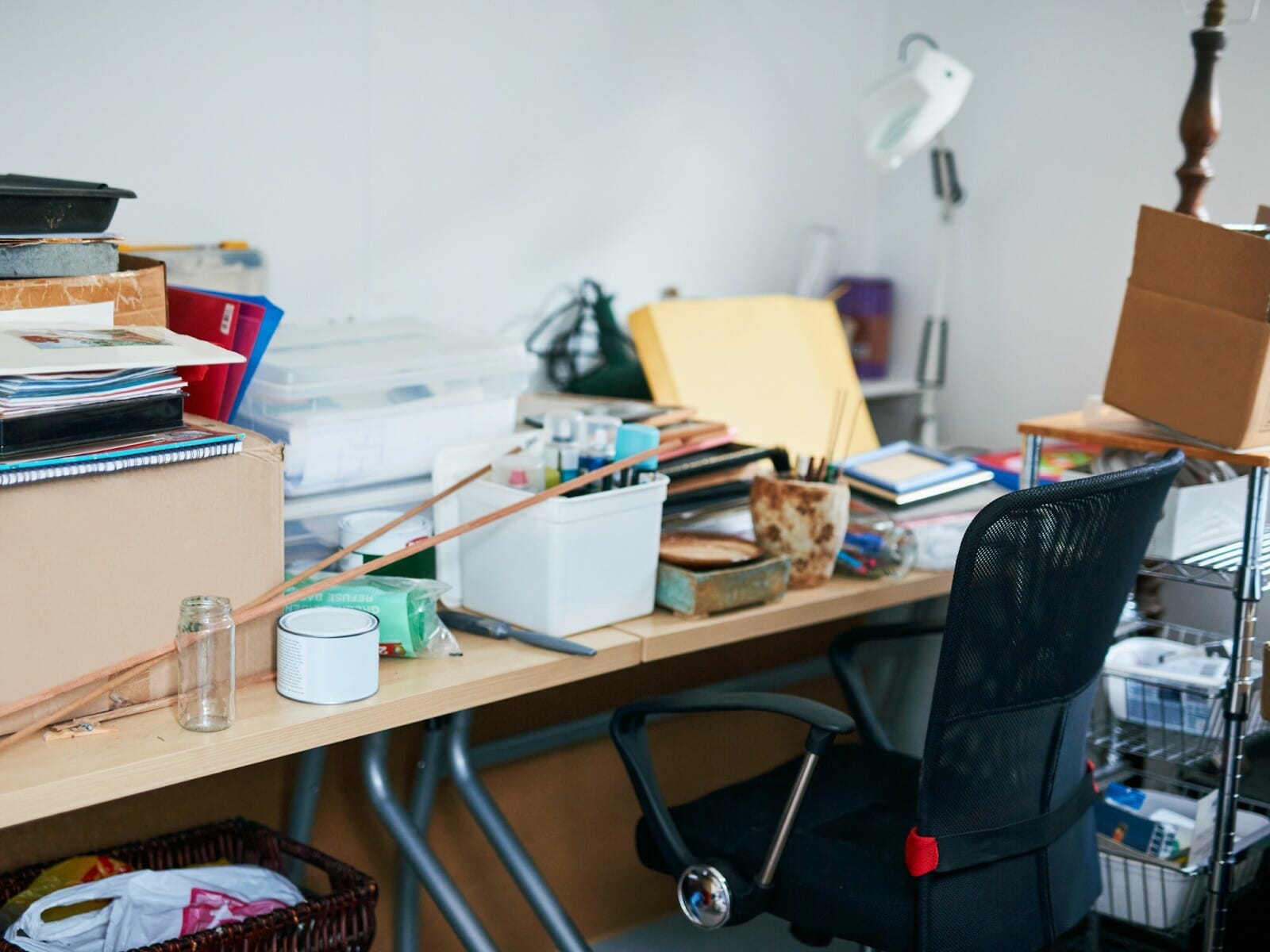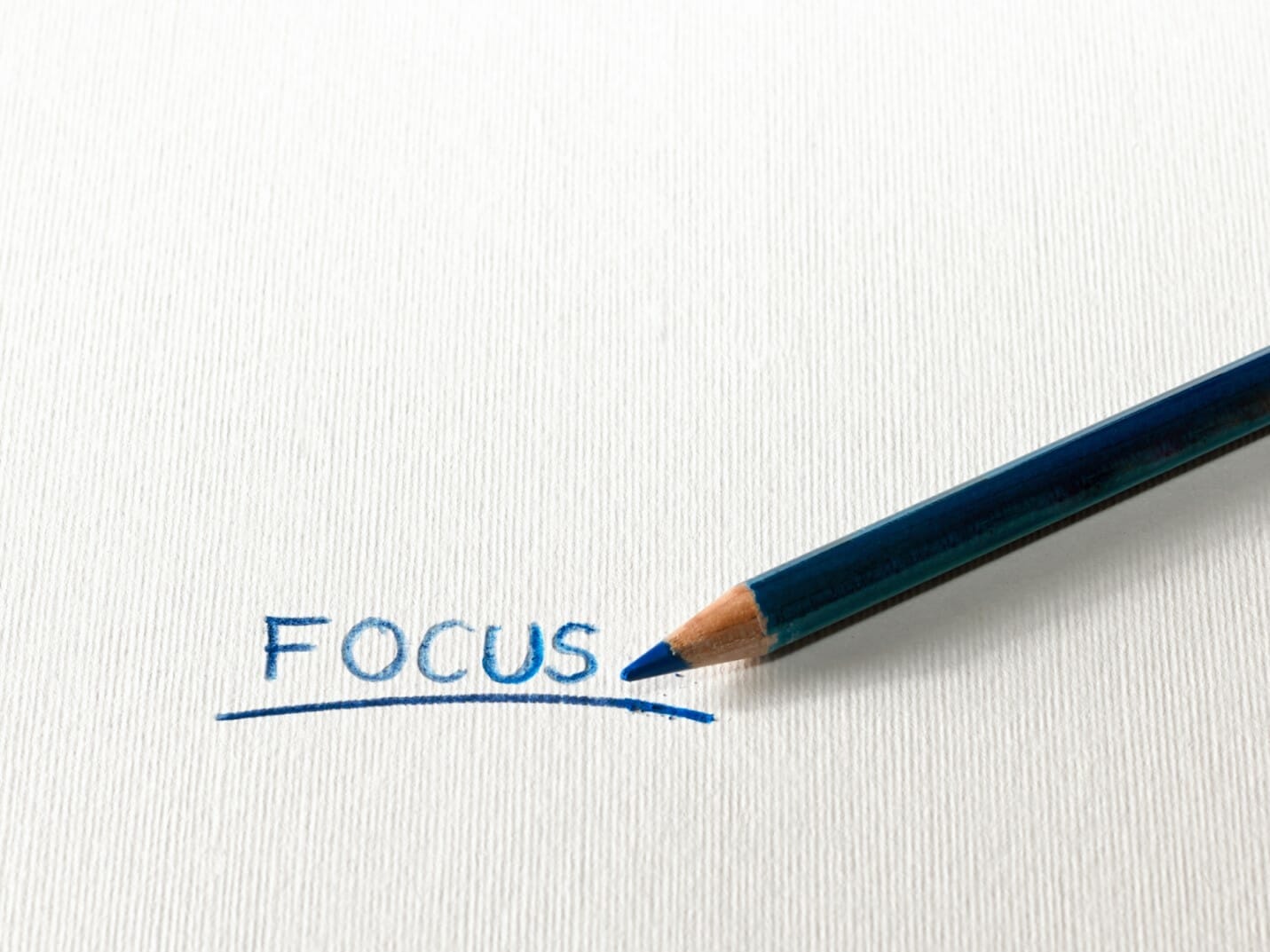
There are varied reasons people hang on to things they don’t need based on their circumstances or deeper-lying struggles. A cluttered home—even one that would qualify as a Level 5 situation—doesn’t stem from laziness or lack of willpower.
More often than not, a cluttered home is the result of a difficult-to-control situation, which is part of normal life.
What’s the source of your clutter? Following, are a few factors that may be contributing to your at-home clutter:

Having children can bring an abundance of joy, but also plenty of clutter.
Baby gear that is only used for a short period of time, rapidly changing clothes sizes, and piles of toys accumulate quickly.
It doesn’t end with the baby phase, though. As all guardians know, older kids and teens bring their own messes into the home.
Food-related messes combined with sleep deprivation can make it difficult to keep up with housework.
With children leaving clutter everywhere and food-related messes needing immediate care, it can be difficult to keep up with housework. Especially when you consider the sleep deprivation that also comes with kids.
Between art and science projects on the counter and smelly gym bags and laundry
left around the house, things can get (or stay!) messy.
It doesn’t help that children aren’t well-known for cleaning up after themselves!

As adults age, they may struggle to keep up with their housework.
Think of all the reaching and bending over. Consider all the hard scrubbing. With health issues, simple cleaning tasks take much longer to accomplish, if it can still be done.
Decreased mobility and increased health issues can make cleaning overwhelming or even impossible.
In addition, it can be difficult to let go of possessions accumulated over a lifetime.
Anxiety can make it difficult to throw away possessions.
People with anxiety may hold on to items in excess in case of a feared emergency or indecision about what to do with items.
Finding the motivation to clean and declutter is often a struggle for someone suffering from depression.
The stress of an out-of-control home situation (whether it’s actually out of control
or simply perceived to be) can create a negative feedback loop.
For example, maybe you’re struggling with depression and lack the motivation to do the dishes. This means the dishes quickly pile up and within a week or two every surface in your kitchen could be covered in dirty dishes.
Now, you’re facing an overwhelming mess that can make you feel even worse—piling on exhaustion, guilt, and shame—and making you even less likely to find the motivation to clean up.
This cycle can leave those struggling with depression feeling more overwhelmed and less able to approach their home situation.
Individuals with ADHD often have intense, passionate interests and may accumulate items related to that interest. In addition, it can be difficult for a person with ADHD to create and stay focused on a plan for a big cleaning project. Anytime there are multiple steps involved, it’s easy for people with ADHD to get distracted.
Obsessive-compulsive disorder is characterized by obsessive, intrusive thoughts and compulsive behaviors. People with OCD sometimes deal with anxieties and emergencies by compulsively buying items. They may have obsessions about running out of essential items or a buying ritual that is difficult to break out of.

Trauma can be a trigger for accumulating clutter. If someone grew up without:
They may feel driven to hold onto things rather than throw them away when they are no longer needed. Research shows that childhood emotional abuse and physical neglect in particular predict higher levels of hoarding symptoms.
People who have experienced loss may also accumulate possessions to soothe the ache of missing their loved one. Buying new things triggers a brief dopamine high, bringing temporary emotional relief.

If you grew up in a home where clutter was common, you are more likely to show these behaviors yourself. You may have a genetic disposition toward it through related diagnoses like anxiety or depression. You may also be more used to an environment where clutter, mess, and even the higher levels of hoarding are the norm.

No matter the reason clutter starts, it’s normal to feel overwhelmed and stressed by the situation. Home maintenance is a big task under any conditions. Certain factors can make the situation feel impossible such as:
Stress can lead to disorganized homes, and disorganized homes can increase stress. Natalie Christine Dattilo, PhD, clinical health psychologist and instructor of psychiatry at Harvard Medical School, calls it a chicken-or-egg dilemma.

“Recent studies have shown that clutter in our homes is associated with higher cortisol levels [our stress hormone], but it’s still unclear which comes first,” says Dattilo.
“Is it that when we are under stress, our ability to maintain a well-organized home becomes impaired? Or when our home is in disarray, does that make us feel more stressed, overwhelmed, and anxious?”
Regardless of the root of the issue, there is a way out. Resources are available to help you deal with your home situation. Bio-One can help! Our services can help ease your stress. For more information on how we can help you with your clutter call (951) 502-7470.

By now, most of us have heard of Marie Kondo’s famous book and Netflix series, The Life-Changing Magic of Tidying Up. It’s definitely nice to be in a clean space, but is it life-changing? Or magic?
Believe it or not, clearing the clutter in your home really can make a big difference in many aspects of your life.
The most obvious reason to clear the clutter is for health and safety reasons.
Too much mess can harbor the growth of dangerous germs, especially in bathrooms and kitchens.
You need to be able to wipe down floors and surfaces. It’s also essential to throw away old food and make sure pipes are clear and functional. This prevents:
But what if you keep everything sanitary?
Are there reasons beyond health and safety to pick up?
Research tells us yes—clearing the clutter can benefit your health in a number of ways.

Decluttering can help you get a better night’s sleep—and not just because you no longer have piles of laundry on your bed.
People living in cluttered homes are more likely to experience insomnia. The exact link between clutter and trouble sleeping isn’t clear, but it is somewhat of a chicken-and-egg problem.
Clutter increases stress levels, which makes it harder to fall and stay asleep. Lack of sleep leads to difficulty concentrating and completing tasks, which can make it hard to clean.
Imagine how your quality of life improves when you’ve had a good night’s rest. Now, let that feeling motivate you—better sleep is on the way.

When your home is messy, it can be difficult to have friends over. You may resist inviting others out of embarrassment, or it may not be possible for practical reasons. Everyone needs a place to sit, after all!
When you create a fresh, welcoming space, you can enjoy the company of your loved ones in your own home. You can even host friends and family from out of town when they come to visit.
Decluttering can help you cultivate your connections and begin creating new ones.
Even if you’re not consciously aware of it, clutter in your home may be affecting your stress levels.

On a conscious level, seeing clutter can be a constant reminder of your to-do list. When you see a pile of items on your counter that need to be put away over and over again, your brain feels a little ping of guilt.
Over time, constantly feeling that need to clean up can create a heavy stress load. And in this day and age when so many are working from home, that added stress all day every day while trying to be productive at work can quickly build to overwhelm.
Clutter can also affect your stress levels subconsciously. Seeing clutter can overwhelm your working memory.
Your brain is constantly working on a subconscious level to determine what you need to pay attention to and what you need to ignore. When there are items everywhere, the brain works harder to process what should be noticed.
On the other hand, cleaning up clutter lets your brain relax. Being in a clean room may decrease your cortisol, or stress hormone, levels.
Just as your brain working hard to ignore clutter can lead to stress, it can also lead to distraction. Cleaning up your space can improve your ability to focus on tasks and get things done.

On a physiological level, your brain will simply have less stimulation. The more you see, the more work your brain has to do. When your area is clean, you can funnel that brainpower into whatever you’re working on.
Clutter affects your focus on a conscious level, too. If you’re noticing cleaning tasks that need to be done, it can be hard to hone in on the task you’re working on.
Even if you’re trying to focus on cleaning, multiple messy areas can make it difficult to choose just one. Every tidying task you complete gives your brain just a little more room to focus.
When you’re in a clean space, odds are you feel better. Studies link cleanliness to a better mood, feelings of accomplishment, and the ability to relax.

Even if life circumstances are bringing you down, having a well-ordered space can still help you respond more calmly to stress.
Emotional regulation is the ability to respond mindfully to your emotions instead of reacting thoughtlessly to triggers. In a clean space, your brain is less distracted, giving you the mental real estate to process your feelings and respond thoughtfully.

Once again, it all comes down to brain space—when you’re not distracted by visual clutter or feeling guilty about jobs left undone, your brain has more space for other things.
You can dedicate the time you spend worrying about clutter to solving problems and growing new ideas. If you create physical art, love home projects, or are a crafter, you’ll have space to work on your projects (and hopefully, motivation to clean them up when you’re done!).
Despite all the benefits of having a clutter-free home, it isn’t always easy to make it happen. If you’re overwhelmed, let Bio-One help you. We have a discreet, compassionate team of cleaning experts who are passionate about helping you.
